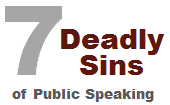College students come into my classroom not only with a flurry of fears and insecurities, but also with baggage in the form of bad presentation habits they have developed over the years.
My students’ bad habits didn’t happen overnight. These habits develop through years and years of watching terrible presentations. While most of us can recognize a terrible presentation, we don’t yet have the tools to make our own presentations great.
In a class called Professional Communication and Presentation, I teach my students how to break their bad habits. These lessons apply to all presenters: teachers, conference presenters, business executives… anyone who has a speech to deliver. Read on to see how you can un-learn these habits, too!
Continue Reading »




































